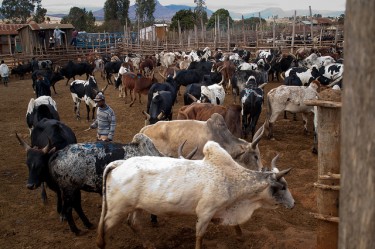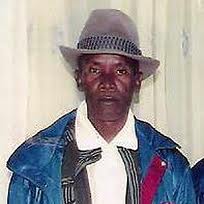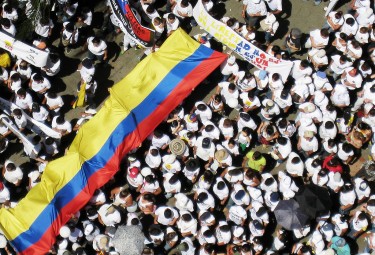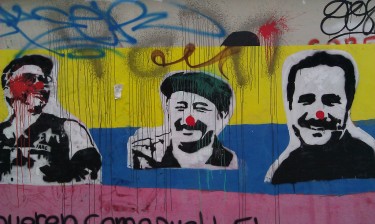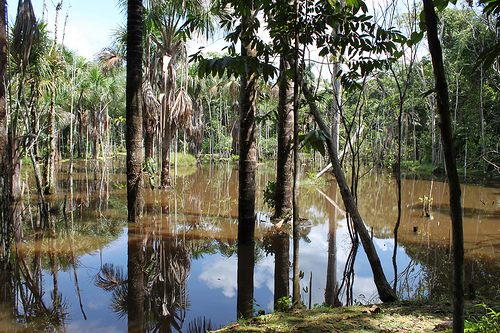debater temas relacionados
ao direito à comunicação, a produção de conteúdo pela população, ao
protagonismo da sociedade no processo comunicacional e a todos os
elementos que compõem a mídia cidadã. Além do debate, o encontro busca
promover o diálogo e o intercâmbio entre as pesquisas acadêmicas e as
experiências inovadoras da sociedade civil de produção de mídia que
enfatizem uma prática cidadã.

VIII Brazilian Citizen Media Conference. Media, Citizenship, and Public Policies. Twitter:
@midiacidada2012
debate themes related to the right
to communication, to the production of content by the population, the
role of society in the communication process and all the elements of
citizen media. Besides the debate, the meeting seeks to promote dialogue
and exchange between academic research and innovatice experiences from
civil society of media production that emphasize citizenship practice.
Searching to understand “how the media helps to construct and
deconstruct social mobilization”, questions will be addressed regarding
communication, health, education, and human rights, with a more general
scope of this session of the conference - Media, Citizenship, and Public
Policies - and with special emphasis on research, media and citizenship
practices in Latin America.
The extensive debate
program, round tables and workshops, especially rich in
work groups, also include the participation of Global Voices contributors,
Elisa Thiago and
João Miguel Lima [en].
On the first day, September 24th, João Miguel spoke on the
“construction of online citizen media coverage” through the case study
of the special page launched in 2011 by Global Voices in Portuguese, the
Belo Monte Dossier.
The presentation was held in a work group dedicated to the theme
“Journalistic practice and the (des)respect towards the citizen,” where
more was talked about Belo Monte and its “social invisibility in media
discourse,” by Josiele Souza, as well as “local telejournalism” and TV
Guairacá, in Brazilian state Paraná, by Ariana Pereira and Luciana
Grande, and radio community projects.
On 25th, Elisa Thiago is addressing “Digital Activism and Citizen
Media” under the transnational perspective of Global Voices, in a
session dedicated to “Considerations about communication and citizenship
in the Latin American context.” The list of speakers includes Tabita
Strassburger, on “the Latin American context and the media experience of
TeleSUR website,” Rodrigo Braz and “the conception of communication
public service in Venezuela,” that also brings a proposal from Mariana
Holando to a “Broadcasting Service in Brazil and Accountability.” Rayza
Sarmento will speak about “conflict discourse in the media as political
opportunity for social movements.”
All the sessions can be followed on
Facebook and Twitter (
@midiacidada2012) through the hashtag
#MidiaCidada2012.
Video and experiences in parallel
In parallel, there will be a
Citizen Video Exhibition with different formats and narrative approaches about citizen media experiences, produced by the
Citizen Media Brazilian Network.
“Enxergando o Invisível” (Seeing the invisible), by Patricia Banuth, is a documentary
project about visually impaired and an audio description on how to use accessibility and digital inclusion. Marconi Araújo
wrote about the film in his blog:
Filmes para cegos ou deficientes visuais? Tal expressão
pode causar, no mínimo, estranheza a quem nunca ouviu falar da
audiodescrição em cinema, recurso que permite a tradução verbal de
cenários e aspectos visuais dos filmes, o que propicia levar a
experiência da sétima arte a todo um segmento da população portadora
daquela deficiência.
Movies for blind or visually impaired people?
Such an expression may cause, at least, a sense of strangeness for those
who have never heard of audio description in cinema, a feature that
allows the oral translation of scenarios and visual aspects of the
film, which provides the experience of taking the seventh art to a whole
segment of the population with that disability.
Also to be screened are”
Entre Vãos“, by Luiza Caetano, about the remaining quilombola community Kalunga Vão das Almas, “
Por longos dias“,
by Mauro Giuntini, with texto from the Nobel laureate of lusophone
litrature José Saramago about the Movimento Sem Terra in Brazil, and “
Dom Helder, o Santo rebelde,” by Erika Bauer.
The
Innovative Experiences in Citizen Media Fair also illustrates current and different practices of media and citizenship in Brazil.
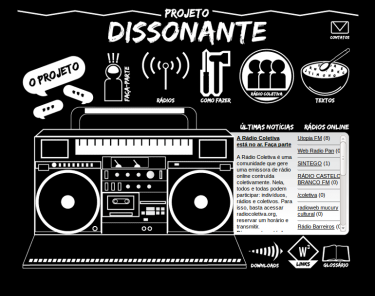
The Rádio Dissonante project will organize a workshop on the creation and maintenance of online radio collective.
Dissonante.org
There will be presentations of the
Informativo Fábrica de Imagens (
@FabricaImagens), from Fortaleza, dedicated to genre issues, sexual diversity and youth, and the independent communication project
Vírus Planetário Magazine (
@VirusPlanetario), comprising graduates, students and academics to discuss politics, culture and media, created in Rio de Janeiro.
The
Vila Embratel TV (
@TVVilaEmbratel)
also will be present with its project of social inclusion that
connects Universidade Federal do Maranhão with teenagers from the
community to produce content for an online TV channel that “shows
positive aspects of neighborhood, usually portrayed in traditional media
in a negative way.”
Written by Sara Moreira · Translated by Yohana de Andrade Global Voices


